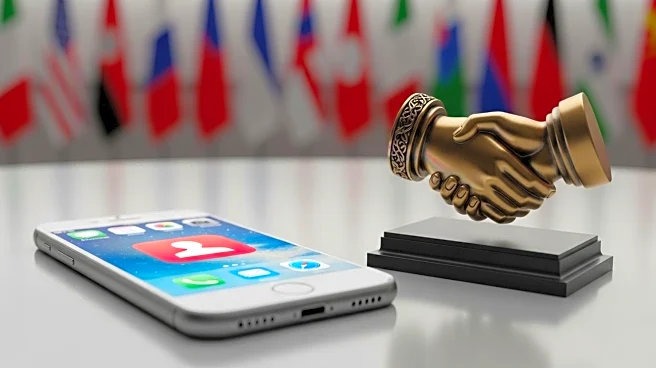What is the story about?
What's Happening?
A significant development in U.S.-China trade relations is underway as President Trump and Chinese President Xi Jinping are set to discuss the terms of a potential deal involving TikTok's U.S. operations. Reports indicate that a framework agreement has been reached, which could lead to TikTok's U.S. operations being sold to a consortium of American firms, including Oracle and investment firms Andreessen Horowitz and Silver Lake. The deal is seen as a rare breakthrough in trade negotiations between the two countries, addressing longstanding concerns over national security and data privacy associated with TikTok's operations in the U.S. The core issue revolves around TikTok's algorithm, which is crucial for the app's functionality and appeal. China's cybersecurity regulator has suggested that ByteDance, TikTok's parent company, may license the algorithm to a U.S. company, rather than transferring it outright.
Why It's Important?
The potential agreement is significant for several reasons. It could alleviate national security concerns in the U.S. regarding data access and influence by foreign entities, particularly the Chinese government. The deal would allow TikTok to continue operating in the U.S., preserving its substantial user base and economic contributions. For ByteDance, retaining control over its algorithm while licensing it provides a strategic advantage, maintaining its competitive edge in the global market. The resolution of this issue could also pave the way for improved trade relations between the U.S. and China, potentially influencing other sectors and negotiations.
What's Next?
The deal's completion is contingent upon approval from various stakeholders, including U.S. lawmakers and ByteDance's board. Congress will likely need to approve the agreement, and there is already political backlash in Washington. Concerns remain about potential Chinese government influence and control, which could complicate the approval process. Additionally, ByteDance's board must agree to the arrangement, adding another layer of complexity. The timeline for finalizing the deal is uncertain, as such agreements typically take months or years to complete.
Beyond the Headlines
The implications of this deal extend beyond immediate trade relations. It highlights the ongoing tension between national security concerns and global business operations, particularly in the tech sector. The licensing arrangement could set a precedent for how intellectual property is handled in international agreements, influencing future negotiations between countries with competing interests. Furthermore, the deal underscores the importance of algorithms and data privacy in the digital age, prompting discussions on regulatory approaches to technology and data management.















